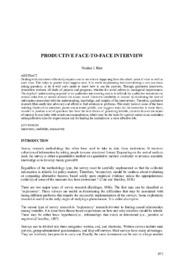Computer-adaptive testing in science education
Abstract
Dealing with interviews effectively requires one to see what is happening from the other's point of view as well as one's own. This helps to predict what happens next. It is worth emphasizing that interviewing is not just about asking questions; to do it well one's needs to know how to use the answers. Through qualitative interviews, researchers evaluate all kinds of projects and programs, whether for social reform or managerial improvement. The depth of understanding required to do qualitative interviewing makes it difficult for qualitative researchers to remain value-free or neutral towards the issues raised. Interview credibility is insured by combining the kind of information researched with the understanding, knowledge, and insights of the interviewees. Therefore, qualitative research blurs easily into advocacy and efforts to find solutions to problems. This study looks at some of the basic building-blocks of an interview, points out potential pitfalls, and suggests ways for the researcher to avoid them,
in order to produce a set of questions that have the best chance of generating reliable, accurate data on the topics of interest. It concludes with certain recommendations, which may be the basis for a policy-maker in an institution setting effective rules for improvement and for leading the institution to a more effective role.
